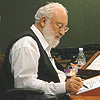Who Is Moses?
 Moses symbolizes the desire for truly unselfish work—as far as can be in Egypt—for the Creator. First, Moses grows in Pharaoh’s palace like an Egyptian prince.
Moses symbolizes the desire for truly unselfish work—as far as can be in Egypt—for the Creator. First, Moses grows in Pharaoh’s palace like an Egyptian prince.
He is similar to all people with their desires and even more like the Egyptians than any other Jew, but then his time to start ruling people and become a leader comes, so the quality of bestowal awakens in him.
We cannot do without Moses. After all, one must have this property awakened by the Creator that will pull him out of the animal state and make him a human, Adam, similar to the Creator. Moses is a property of Bina, which should stand in the middle between Malchut and Keter.
Moses is a property of the Creator clothed in a person from above so that one could connect with this property like Malchut connects to Moses from below. Without this property, one generally would not be able to understand what bestowal is and how one can think of something higher than his egoism, his Malchut. Without Moses’ property in each of us, we would never become the Creator’s workers. It is this property that distinguishes a human being from an animal.
Moses is me, a special quality in me, acquired by the reforming Light that lets me work with the source. This property of Bina is within a person, and this is the means by which one corrects oneself. Bina does not yet merge with the Creator. It only “sweetens.” It is the Light of Hassadim. Bina and Malchut join to work together in order to reach Keter properly and merge with the Creator.
The conditions for entering Egypt are either a willingness to unite or resistance to it. In other words, people should be for or against unification, not indifferent to it. Egypt includes the sons of Jacob, those who have been trained by the forefathers.
The step of the forefathers is completed at this point. The stage of the sons, “the sons of Israel,” begins because Jacob, in a great state, is called Israel. This is a new state, a new stage.
Why doesn’t Pharaoh kill Moses? He cannot do it because one can only kill someone with whom he is somehow connected, and Moses has nothing to do with Pharaoh. He escapes from Pharaoh’s palace and returns to him as a completely different person, with no connection to the past.
It’s a miracle, because Moses grows up in Pharaoh’s hands. It is written in the Midrash that Moses sat on Pharaoh’s lap, played with his beard, and tried on his crown. Of course, this is not about historical events, but about the secrets of the Torah. Then, Moses returned to Pharaoh, and they did not seem to recognize each other. It does not look like a grandfather meeting with his runaway grandson.
Moses no longer refers to Pharaoh, and therefore Pharaoh can do nothing: neither kill, nor break, nor rule over him. Moses exited the power of Pharaoh. Pharaoh is Malchut, and Moses is the stage of Bina. They are not connected with each other. And Moses cannot do anything with Pharaoh, either. Only the Creator, by controlling them both, is able to awaken forces in them.
First, Pharaoh raises Moses in his palace because, thanks to the people of Israel, Egypt was getting richer. The egoistic desire to enjoy uses the quality of bestowal for itself and receives huge profits.
As soon as we are in the group, wish to unite and cannot do it, it is a sign that we are on the threshold of entering Egypt. We reveal resistance to unification in ourselves. We need to take care of the connection in the ten to the extent that we feel how Pharaoh rules the relationship between us.
Unity in the ten is expressed in the desire to reveal the Creator.
[223068]
From the 1st part of the Daily Kabbalah Lesson 3/11/18, “Preparation for Pesach,” Part 1
Related Material:
“And Moses Alone Shall Approach The Lord”
And Moses Blessed The Children of Israel
Everyone Must Become Moses







Discussion | Share Feedback | Ask a question